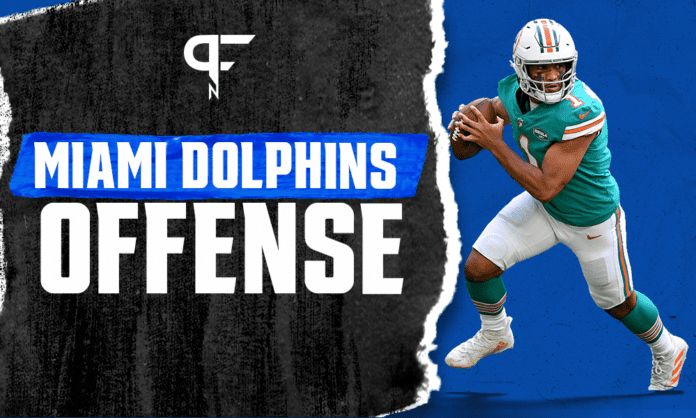Brian Flores is all about accountability. While he won’t embarrass players who make mistakes, he also won’t sugarcoat reality when reporters ask about shortcomings. And yet, he’s now created a dynamic in which both everyone — including himself — and no one are responsible, at least publicly, for how the Miami Dolphins’ offense performs on Sundays.
Brian Flores implementing two Dolphins offensive coordinators in 2021
The Dolphins’ most important objective this year is to develop Tua Tagovailoa into a franchise quarterback. Flores believed the best way to make that happen was to name not one but two offensive coordinators — George Godsey and Eric Studesville.
We don’t know which of these former position coaches is the primary play-caller, but we have strong suspicions it’s Godsey, who had that responsibility for a brief time a few years back in Houston. Still, we don’t know that for certain because no one in the organization will tell us.
When asked Tuesday what he gains from maintaining that mystery, Flores replied:
“We just try to keep things internal. I guess my question would be what do you gain by that?”
We know who’s responsible for the play, the Miami-based reporter replied.
“I know who’s responsible. That’s kind of where we go.”
Does the opponent gain anything from knowing?
“They may. They may.”
Dolphins Live: Coach Flores meets with the media ahead of today’s practice. https://t.co/qaglipPbEp
— Miami Dolphins (@MiamiDolphins) August 17, 2021
Those responses should come as zero surprise to those who have spent any significant time with Flores.
Flores opts to keep who’s calling plays internal
Flores’ personality and background (he grew up in one of Brooklyn’s most dangerous neighborhoods and then spent his formative professional years trained by the most secretive of coaches, Bill Belichick) have conditioned him to believe that less is usually more, regarding the disclosure of sensitive information.
But Flores’ approach with the Dolphins’ offensive coordinator position has — either intentionally or not — created a scenario in which there’s no one person who will receive the praise or blame for the design and implementation of an offensive game plan.
It’s truly a group effort that extends far beyond the coordinator level.
Neither offensive coordinator radioed calls to Tua on Saturday
Neither Godsey nor Studesville actually radioed the calls into Tagovailoa’s ear during Saturday’s preseason opener against the Bears. That responsibility fell to new quarterbacks coach Charlie Frye.
Flores explained the rationale with a lengthy, logical answer Tuesday:
“I think when you’re a position coach, and you spend time with a player every day, you kind of have your own language, you have your own conversations about different plays — ‘Hey, remember we talked about this like this. Hey, remember we saw that in practice?’ — that’s a different relationship or way of speaking that it is with a coordinator. I know that because I’ve been a position coach and a coordinator. The idea behind Charlie being the person giving the play-call is that one or two things that they talked about in their room, specifics to quarterbacks. That just makes sense to me. I think that’s pretty reasonable. And that’s why we do it that way.
“… Look — obviously you guys haven’t been up in the coaches’ booth. This is what happens — somebody’s watching the front side of the play, somebody’s watching the back-side of the play. Somebody’s watching coverage/rotations, somebody’s watching fronts. So there’s a lot of dialogue. I think at the end of the day, what happens is somebody gives Charlie the call, and Charlie says, ‘Hey Tua, wristband 33.’ That’s not six people talking to Tua. That’s the information the quarterback gets. In the headset, the coaches say, ‘The back-side’s doing this. You might want to call wristband 38.’ That’s kind of how that goes.”
Flores accepting media backlash if things go poorly
In the end, Flores is right. The people inside the Dolphins’ building will know what everyone’s job is on game day, and if things go poorly, it’ll be relatively easy to identify who didn’t hold up their end of the bargain.
But outside of the building, Flores has set himself up to be the one who takes most — if not all — of the media’s slings and arrows in that scenario.
It’s entirely possible that that is a feature of the team’s setup, not a bug.
Adam Beasley is the NFL Insider for Pro Football Network. You can read all of Adam’s work here and give him a follow on Twitter @AdamHBeasley.

